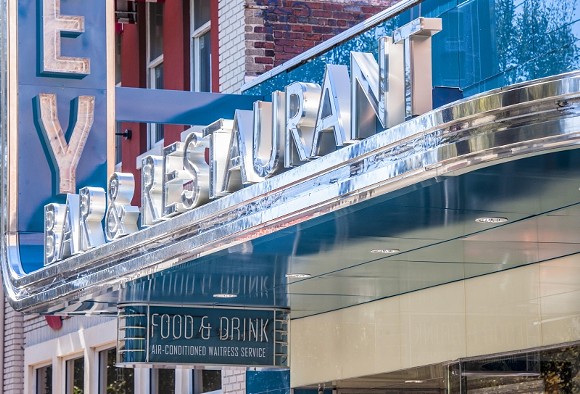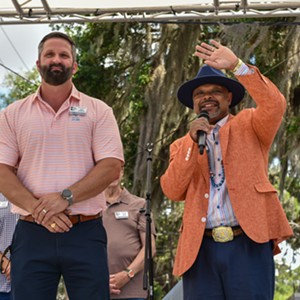1: That Crazy Election S#&% Show
In a town known for quirky elections with quirky characters, the 2015 City of Savannah election may have taken the cake.
With a cast that included gruff gadfly Murray Silver, affable train buff Louis Wilson, cartoonishly outspoken car dealer O.C. Welch, and incumbent Mayor Edna Jackson wearing a dollar bill corsage—among many other interesting people—it was all, to put it mildly, fertile ground for jokes and journalism alike.
On a less humorous note, the core election issues of crime, competence, and corruption played out with very real stakes for a Savannah just making its way out of recession and still dealing with multi-generational issues that put our continued quality of life in peril—not to mention a general sense that this City Council was simply in way over its head.
For once in a blue moon, it seemed that the bluster about change had a foot in reality. All City Council incumbents, including Jackson, faced opposition.
You might not have known it on Election Day, Nov. 3, however. The highly touted challenge by Shaundra McKeithen against Estella Shabazz failed, though not by much. Kim Dulek’s valiant effort against John Hall also fell barely short. Tony Thomas, despite facing several opponents, was easily reelected.
Mayor Jackson got the most votes against Eddie DeLoach, Murray Silver, and Louis Wilson, but ominously failed to get the 50 percent-plus-one needed to avoid a runoff with DeLoach.
That election night, those who wanted change had to cry in their beers and settle for the runoff, and for Julian Miller knocking off incumbent Mary Ellen Sprague in what would become the pivotal District 4.
(A bizarre subplot involved the hundreds, possibly thousands of voters in unincorporated Chatham County, mostly in the Islands area, who were under the mistaken impression that they were allowed to vote in the City of Savannah municipal election.)
But with December came what is surely the most historic runoff election in Savannah’s history, boasting a higher turnout than the actual general election, something almost unheard of anywhere.
As the election gods would have it, the runoff pitted three white men against three black women. Predictably, the runup included all kinds of unfortunate racial allegations and hard feelings.
In the end, the elections weren’t even close. The tsunami for change was simply too overwhelming, and Mayor Jackson’s incumbent coattails far too short.
Jackson lost by well over 1000 votes, as Team DeLoach diligently mined every vote they could from District 4. Incumbent Mary Osborne went down to defeat to Bill Durrence, and Brian Foster took the open Alderman at Large seat over Alicia Blakely.
And just like that, Savannah had a brand new mayor and brand new Council working majority. They and the surviving incumbents will all be sworn in early January. We’ll see how they do. – Jim Morekis
2: Murders & Mergers
As of this writing, Savannah has experienced 52 murders in 2015. (There are several more homicides, bringing the total closer to 60, but several of those are considered justified, i.e. self defense.)
In simple terms: Savannah averaged a murder per week this year.
It is a total very near the height of the deadly activities of the Jivens gang in the 1990s. The difference, however, is that the Jivens gang was largely a self-contained organization. The violence 20 years later on Savannah streets seems more random, more stemming from petty beefs, more like violence just for the sake of violence.
Without question, the entire election hinged on the issue of crime. But contributing to that crime were the subsidiary issues of staffing of the police department and the disastrous disintegration of the City/County police merger.
It’s hard to discuss or understand crime in Savannah without the backstory of a police department in disarray, and the politicians who allowed it to happen.
For reasons still not entirely clear, Metro Police were allowed to erode to about 100 officers below the recommended staffing level (which some observers say is itself too low). By some estimates, when you count up all the vacancies and vacations and training days, Metro Police are understaffed by as much as a quarter!
Reports from behind the scenes indicate that City Manager Stephanie Cutter’s office woefully mismanaged the issue of competitive police salaries, putting a package on the table that actually penalized trained, experienced officers for trying to make a long-term career in Savannah.
As for the disagreements over the decade-old City/County police merger, they’re mostly over money and control. Long story short, the City contends that the County reneged on a funding formula by which taxpayers in the unincorporated area of Chatham County would help pay for merged police services.
The County contends that the formula needs to be changed and that the County is not receiving the quality of services they deserve, alleging that police spend far more time and resources in City limits attempting to combat the extraordinary levels of crime there.
Other issues of control were more or less solved to the County’s satisfaction, for example, CNT and Animal Control.
But the sticking point of money vs. services seemed to remain, exacerbated by what the County insists is high-handed arrogance from City officials which borders on bad-faith negotiation.
The entire story came to a head on Friday, Oct. 23, when the County Commission in a surprise vote opted to conclude the merger and take formal steps to move on with its own as-yet-to-be-formed police department.
A clearly panicked Savannah City Council held an “emergency meeting” later that day, but all they managed to do was pass a delusional motion essentially to ignore the County’s vote.
As of this writing, it is still technically possible for the merger to remain intact, largely due to the efforts of County Commission Chairman Al Scott to overturn his own Commission’s majority vote. But many observers say the rift has become too wide and too personal in nature to overcome. – Jim Morekis
3: Not Much Justice for Matthew Ajibade
On January 1, police responded to a call at a gas station at Abercorn and East Duffy and arrested 21-year-old Matthew Ajibade on charges of battery. He was taken to the Chatham County Jail, where he became combative with deputies, and was forced into a restraining chair. Several hours later, he was found dead.
The next day details emerged about yet another case of an unarmed black man dying at the hands of law enforcement: Nigerian-born Ajibade was a gifted artist and thinker who came to Savannah to attend SCAD and Savannah Tech. He worked several jobs, including stints at Banana Republic and Wells Fargo, and was considered affable, conscientious and universally adored by co-workers and customers.
He also suffered from a well-documented case of bipolar disorder. Reports indicate that his girlfriend informed the arresting officer of Ajibade’s condition and gave the officers a prescription bottle labeled as Divalproex. She begged them to take him to the hospital, saying that he was in the midst of a bipolar episode and needed medical attention.
Instead, they took him to jail, where he broke a deputy’s nose and gave another a concussion before he died. Chatham County coroner William Wessinger ruled the death a homicide.
The Georgia Bureau of Investigation was called in, but it wasn’t until five months later, in May, that nine sheriff’s deputies were fired over the incident that led to Ajibade’s death. On June 24, District Attorney Meg Heap’s office released indictments: Former deputies Maxine Evans and Jason Kenny and contract health care worker Gregory Brown were charged with involuntary manslaughter. Kenny also faced a charge of aggravated assault and cruelty to an inmate, and Evans and Brown were accused of public record fraud for falsifying the restraint chair log.
But it would take many more months for Ajibade’s family to find out exactly what happened to their son and brother. Attorney Mark O’Mara, the CNN legal correspondent who famously defended George Zimmerman in the killing of Trayvon Martin, represented the Ajibade family throughout the year, pressing for the autopsy release and questioning the glacial pace of the investigation.
“You don’t die from bipolar disorder in a restraining chair,” O’Mara told Connect. “(T)his family deserves to know what in God’s name happened to their son.”
During the trial in October, a video taken on the night of Ajibade’s death quickly went viral. In the harrowing clip, Kenny is seen using a Taser repeatedly on Ajibade’s testicles as the young man screams “I’m going to die!” O’Mara expressed outrage that the first time the family learned of the video’s existence was by Twitter.
“It is nothing less than torture,” he said. “It’s sadism.”
In spite of the shocking video and international response, the jury Kenny and Evans found not guilty of manslaughter, though Kenny was convicted of assault and cruelty. He was sentenced to one month in jail—to be served on weekends—and three year probation. Evans was found guilty of public records fraud and perjury; she received six years of probation and will not serve jail time. Brown was acquitted of the manslaughter charge and received a three-year suspended sentence for lying to investigators, punishable by a $1,000 fine.
“I knew that that same system that failed Matthew would not be the system that got him justice,” Ajibade’s cousin Chris Oladapo told NBC News after the verdicts.
“We expected nothing, and we got nothing.”
O’Mara is pursuing a civil case on behalf of the family against Kenny and Evans as well as the Chatham County Sheriff ‘s Department. – Jessica Leigh Lebos
4: Pushback Against Palmetto Pipeline
When energy giant Kinder Morgan announced plans this spring to build a 360-mile pipeline across four of Georgia’s major rivers, environmental groups and unwilling landowners went into action.
The billion dollar project proposes to connect the already-existing Plantation Pipeline in Belton, SC and pump up to 7 million gallons of gasoline, oil and ethanol a day by slicing across the Satilla, Altamaha, Ogeechee and Savannah watersheds to a distribution hub in Jacksonville, FL. The construction would disrupt fragile ecosystems and wildlife, and risks include leaks, explosions and potential pollution to the drinking water supply.
Also at stake are property rights: Kinder Morgan must commandeer hundreds of acres of private property to create a 50-foot easement along the dig zone, and its attorneys had planned to use eminent domain to snap up the land. Though it hadn’t received a certificate of public convenience and necessity from the Dept. of Transportation, the company was already sending out surveyors—two of whom were arrested on the private property of Savannah Morning News owner William Morris.
KM hosted several “informational meetings” about the Palmetto Pipeline, but the DOT hosted only one official hearing.
In May, a group of landowners, Riverkeepers, Center for a Sustainable Coast, One Hundred miles and other organizations united to form Push Back the Pipeline.
The coalition submitted commentary to the DOT in opposition of bestowing Kinder Morgan with the necessary certificate to seize private property under eminent domain, citing the company’s “deficient record on safety and malfeasance” and the logic that corporate profit does not fall under the public good.
Gov. Nathan Deal followed up with strong words against the project, and the DOT denied the certificate at the end of May. Kinder Morgan immediately appealed the decision, an action immediately met by multiple motions to intervene.
The DOT denied the certificate again in November, and KM’s appeal is currently under review in Atlanta.
KM also owns Elba Island, the liquid natural gas station that is slated for expansion a few miles from downtown Savannah. The LNG plant will transform from an import site to an export site, using 10 liquefaction units with the capacity to ship out 4 million tons of liquefied natural gas a year. The project may see up to 30,000 trucks a month crossing over to the island during construction, and will continue transport liquid nitrogen, ethylene and other hazardous materials when completed.
In the meantime, Kinder Morgan has been trying to sweeten its public image by donating to charities in cities along the proposed pipeline route, around $200,000 since June.
However, the transport goliath may have to start pinching pennies soon; its stock fell 30 percent in a week this month, cutting investor dividends by 75 percent. – Jessica Leigh Lebos
5: Gnats' Goodbye
Savannah’s favorite lazy summer evening tradition has moved.
The Sand Gnats, Savannah’s minor league baseball team since 1984, announced in May their move to Columbia, South Carolina, a short 150-mile drive away.
Under rainy skies, the Sand Gnats ended their season, and an 18-game winning streak, by tying with Kannapolis.
The team, now the Columbia Fireflies, will play at the newly-built Spirit Communications Park starting this season.
James Freier, owner of Hardball Capital that owns the now-departed Gnats, wanted a new stadium by either renovating or demolishing Grayson.
While the historic quality is part of its draw, Grayson is pretty outdated. Freier wanted the city to ditch Grayson in favor of a venue that could host concerts as well as baseball, but the city balked.
In the wake of the Gnats’ farewell, a college summer league has signed a two-year contract to play in Grayson Stadium. But whether Savannah will get a new minor league baseball team in the future is still up for discussion, and it won’t come without a hard look at Grayson Stadium.
Grayson Stadium has a rich history in Savannah—it was begun in 1927 and much of its current structure dates from the early 1940s—so it’s kind of an obvious choice for historic tourism that the city saved Grayson and sacrificed the Gnats.
“We’ve made a lot of relationships there. We did not want to be the people who pick up and leave,” Freier told the Savannah Morning News at the time. – Rachael Flora
6: Shabazz 'n' Run
Chatham County Commissioner Yusuf Shabazz again raised questions as to his fitness for office this past summer, when he was charged with a hit-and-run of a City traffic worker.
Shabazz allegedly not only disregarded the traffic worker’s sign during a road project, he dinged the worker with his vehicle as he drove past.
Incredibly, he supposedly returned to the scene and taunted, “Tell the police I’m Commissioner Shabazz.”
No problem, Mr. Shabazz, the police were told! The Commissioner’s trial begins in February. He has pled not guilty to all charges.
It’s not the first run-in with the law, sort of, for Shabazz. In summer 2014, after the police shooting of Charles “Mista Dee” Smith, Shabazz urged Westside residents to boycott the store in which Smith was arrested.
The store’s “crime,” Shabazz says? Cooperating with police! – Jim Morekis
7: Gay Wedded Bliss
On June 26, the U.S. Supreme Court ruled to uphold the fundamental right of same-sex couples to marry, overriding the last 13 states in the country that legally forbade it—including Georgia.
LGBT citizens and their supporters rejoiced to know they were now afforded the same legal protection, tax status and parental rights as opposite-sex married couples.
The swing vote in the 5-4 came from Justice Anthony Kennedy, who wrote that the Constitution guarantees same-sex couple “equal dignity in the eyes of the law” through the Fourteenth Amendments’ Due Process Clause, which “prohibits state and local government officials from depriving persons of life, liberty, or property without legislative authorization,” and the Equal Protection Clause, which was the basis for desegregation in the public education system.
Justice Antonin Scalia, one of the decision’s most vocal opponents, called Kennedy’s poetic introduction “the mystical aphorisms of the fortune cookie.”
In Savannah, Christie and Kindra Baer were the first couple to benefit from the ruling, making their union official at the Chatham County courthouse a few hours after the Friday morning ruling, reported WJCL.
But not everyone waved their rainbow flags high. Kentucky court clerk Kim Davis became a conservative icon for her refusal to comply with the federal edict, earning her an audience with Pope Francis.
And while the Georgia legislature tabled SB 129—the “religious liberty” bill that essentially allows business owners to discriminate against anyone that offends their values—back in February, a new version of the Georgia Religious Restoration Act is expected to rear its ugly head when the Assembly reconvenes this January. – Jessica Leigh Lebos
8: Cultural Controversy
After years of planning, the Cultural Arts Center finally broke ground with just days left in 2015. But there’s not a rousing cheer in the background about it.
The painfully slow process started around 2007, when the city formed the plan for a new arena on MLK and Oglethorpe, right across from the current Civic Center, and voters opted for their SPLOST funds to go towards infrastructure.
Just last year, city officials were promising a 500-seat theater and a 125-seat performance space with removable seats, along with other upgraded amenities. But the project quickly went way over budget, and the committee ditched the larger theater.
Many argued that those changes negatively affected the design and indeed the entire purpose of the facility, but the city disagreed.
Additionally, the production cost has nearly doubled. In 2006, the project was quoted at $13.4 million. In 2013, it went up to $20.4 million and could rise to $25.5 million before completion.
Still, despite structural and financial concerns — to mention election-year rhetoric— the project forged ahead.
Newly elected Mayor Eddie DeLoach echoes many observers in saying Savannah deserves a “world-class” Cultural Arts Center, and that the project probably deserves yet another look to make sure the design fits our needs and reflects well on a community which, after all, prides itself on its cultural offerings.
We’ll see which twists the story of the Cultural Arts Center offers us in the new year. – Rachael Flora
9: The Grey is Golden
When The Grey opened late last year, everyone knew it would be a big deal, but nobody knew how much.
In 2015, The Grey was a semifinalist for the highest honor in culinary awards: the James Beard Award as Best New Restaurant.
The Grey was also a Beard nominee for for best restaurant design or renovation in a restaurant 76 seats and over.
The renovation has truly been a focal point of The Grey from the beginning. Owner John O. Morisano and the Parts and Labor design firm restored the old Greyhound bus station to its former glory, keeping the 1938 blue and white facade.
Chef Mashama Bailey, formerly of renowned restaurant Prune in New York, has created a menu that’s Southern soul food influenced by Europe and West Africa.
The only other two restaurants in Savannah to receive a James Beard award have been Elizabeth on 37th, which won in 1995 for best American chef in the Southeast, and Mrs. Wilkes' Dining Room, which won in the American Classics category in 2000.
The Grey has also been profiled by the New York Times, the Washington Post, and Eater. But with all this national attention, Morisano still has goals to attain.
“We want to be the spot for Savannahians; we want to be that neighborhood spot,” he said at the time. “We want people to say, ‘Should we cook or should we go to The Grey?’ on a weeknight. And if we become one of those spots in five years, I’ll call it success.” – Rachael Flora
10: SAV #FeelstheBern
You’d have thought Savannah was hosting the Rolling Stones the way the lines snaked around the Civic Center on Nov. 22. With his unfashionable glasses and untidy fringe of white hair, Bernie Sanders may be an unlikely rock star, but for many, he’s exactly the Presidential type.
The Democratic (well, maybe) candidate was originally booked to speak at the 500-person Savannah Station on that sunny Sunday afternoon, but after the RSVPs started rolling in, organizers changed the venue to the larger Johnny Mercer Theater.
The stop was scheduled after more stumping for the February primary in South Carolina, where opponent Hillary Clinton leads in polls 2-to-1. Sanders ended the tour at the Fox Theatre in Atlanta.
Over 2,600 cheering supporters showed up to hear the senator from Vermont speak about his support for single-payer health care, criminal justice reform and a higher education system funded by Wall Street.
For a solid hour and a half, Sanders also railed against an economy rigged to disempower the middle class and any continued resistance about the reality of climate change.
The only presidential candidate from either party without a super PAC, Sanders’ campaign has been largely funded with small contributions—spokesperson Symone Sanders reported the average is $30. The campaign broke records last week when it reached 2.3 million individual donations.
Earlier this month, Sanders’ campaign was dealt a blow when the Democratic National Committee denied it access to voter data after a campaign employee illegally viewed information from Clinton’s campaign. Sanders immediately launched a lawsuit to regain access, and access was restored on Dec. 22.
But what has been criticized by some as the DNC’s effort to thwart the underdog may have inadvertently fueled his fire: After the kerfuffle, Bernie’s coffers racked up a million dollars in a single day. — Jessica Leigh Lebos
11: Jolene Byrne vs. The Morning News
One of the more bizarre chapters in local journalism happened as the Savannah Morning News started an aggressive vendetta against first-term Savannah/Chatham School Board President Jolene Byrne—over the unlikely issue of whether or not school buses should be safe!
The controversy began with the Board considering terminating the school bus contract of First Student, a multinational monolith which after nine years still couldn’t seem to get anything right with local bus routes and maintenance.
An internal audit—which Byrne says Superintendent Thomas Lockamy’s office possibly deliberately kept from the School Board—seemed to show an alarmingly high number of First Student-maintained buses not only not roadworthy, but downright too dangerous to transport children.
Seventy-five percent of the buses, to be precise!
The sentiment and the votes were already there to terminate First Student, and indeed the vote was unanimous.
The catch was in their eventual bid-winning replacement, Reliant Transportation.
The Morning News stubbornly alleged that Byrne had an unethical relationship with Reliant lobbyist Mike Vaquer.
Day after day, story after story, editorial after editorial, cartoon after cartoon, the daily paper vilified Byrne not only as corrupt, but seemed to clearly insinuate in a sexist manner that she is too airheaded and ditzy to know what she’s doing.
(The fact that the daily’s education reporter is also a woman didn’t seem to matter too much in this regard.)
The attacks became so predictable that Byrne began issuing daily Facebook updates on what the Morning News had asked her that day for the next day’s planned hit piece.
At one point, the daily said Byrne illegally accepted Vaquer’s gift of tickets to the Rolling Stones in Atlanta.
Right after being contacted for comment by the Morning News about the tickets, Byrne posted an image of the cancelled check she used to pay full price for them.
In the end, the daily paper trumpeted the supposed “burying of the hatchet” between Byrne and Lockamy... a hatchet first swung by the paper itself. – Jim Morekis
12: The Mother Of All Lawsuits
Ordinarily, civil lawsuits wouldn’t merit much of a mention. But when a civil lawsuit at least on the surface appears to tie together some of the most long-rumored, deeply disturbing allegations going to the heart of Savannah’s most serious issue, we pay attention.
Brought by attorney William Claiborne —who coincidentally or not is also the Chairman of the Chatham County Democratic Party—the suit has four plaintiffs, all former local cops.
The long list of defendants includes some of the biggest names in recent Savannah history: Former City Manager Michael Brown, former Chatham County Commission Chairman Pete Liakakis, former Chatham County Manager Russ Abolt, current Assistant Police Chief Julie Tolbert, and former Police Chief Willie Lovett, now imprisoned.
The suit alleges that the above officials knew about and turned a blind eye to deep and profound corruption at the upper ranks of the police department.
Allegations of police corruption aren’t new here; that’s why Lovett is in prison already.
What’s different about his suit is the content of the charges, namely that said corruption specifically involved in allowing drug dealers to operate unimpeded.
The glut of drugs at the street-level, of course, has in part led to the extraordinary amount of shootings and murders in Savannah.
Detractors instantly noted that Claiborne’s suit mostly targets former officeholders, and conspicuously doesn’t name any of the Democrats actually running local government today.
But the possibility that these long-rumored allegations could get their day in court means more key information could finally see some sunshine. – Jim Morekis
13: #Fix80Now
The road to Tybee Island may lead to paradise, but the journey is undeniably treacherous.
The Georgia Department of Transportation (GDOT) reported that crash rates on U.S. Highway 80 between the Bull River and Lazaretto Creek bridges are 50 percent higher than the state average for other two-lane roads.
Countless people have been injured in accidents on this cross-marsh stretch, and seven have died since 2009, including beloved local Susan Allen Bartoletti on October 8.
The dangers aren’t limited to those on the road: During busy summer months, even a fender bender can snarl traffic for hours at a time, cutting off the island from first responders and preventing those in need of medical attention from getting to the mainland.
Citizens have been begging for solutions better signage and lower speed limits since the 1990s, but funding significant infrastructure improvements must come from the state and federal levels.
After a 1999 study that examined possible solutions, GDOT dismissed a $125 million plan that would have widened Highway 80 to four lanes.
That’s just as well: Further studies show that widening Highway 80 to four lanes could encourage speeding and increase fatalities; it might also have negative environmental impacts and on certain days, bring more visitors to the island than it can handle.
Transportation advocates like the Savannah Bicycle Coalition now favor a two-lane design with wider shoulders and a raised profile to safely accommodate bicycle and pedestrians. This echoes the findings of the 2012 MPC U.S. 80 Bridges Replacement Study, which also includes recommendations for more visible turning lanes at McQueens Trail and Fort Pulaski. That project would cost an estimated $65 million; the MPC is currently seeking matching funding from the state and feds.
Let’s hope we figure it out sooner than later: Judging from the footage of a submerged Highway 80 during a recent king tide, it won’t be long until it’s all underwater anyway. – Jessica Leigh Lebos
14: "The Cover"
Don’t worry; we won’t print it again. But suffice it to say that our misguided parody of a famous Norman Rockwell painting violated the Prime Directive of Media:
Don’t. Become. The. Story!
It began innocently enough, as a Thanksgiving Week cover homage to Rockwell’s iconic, oft-paroded painting, “Freedom from Want,” a week before the runoff election.
The deeply unfortunate catch, however, was the depiction of Mayor Edna Jackson serving the turkey, complete with apron.
In the highly charged local environment of a high-stakes election which already had a clear racial subtext, the cover image was like pouring gasoline on a fire, with literally the worst possible timing.
Within hours of the cover image posting to Facebook, hundreds of outraged comments from readers black and white accused us of orchestrated racism.
By that night, the Georgia NAACP had issued a statement condemning it.
Despite the sudden characterization of our little liberal rag as a cabal of hooded Klansmen, the truth, as usual, was much more pedestrian: We fell victim to Groupthink, and honestly thought the cover was clever and humorous.
The fact that we were so incredibly clueless isn’t that much better, though. We issued as timely an apology as possible and collectively vow to be more empathetic, inclusive, and intentionally aware of cultural and racial sensitivity in the future. – Jim Morekis
15: Robyn Reeder: RIP
Broughton Street shines a little less after the passing of Robyn Reeder. The inspiration behind Primary Art Supply and Civvies succumbed to her long fight with cancer in October.
Robyn also played in beloved local bands Hot Pink Interior and Silver Machine and was undoubtedly the coolest girl in town. She was best known for helping turn Broughton from a sketchy ghost town to a hub of art and fashion.
“With her passing and the announcement of the further Ben Carterization of downtown, it felt like Robyn had taken the Savannah she made with her,” wrote my colleague Anna Chandler.
Anna wrote a beautiful remembrance about Robyn for Connect, and Robyn’s husband Igor Fiksman wrote a blog post detailing their life together.
I moved to Savannah in 2011 and never got the chance to know Robyn, but I feel like I did. I’m so thankful to her for creating the Savannah that I fell in love with on a college tour, and I appreciate how much work she put into everything she did. – Rachael Flora











































